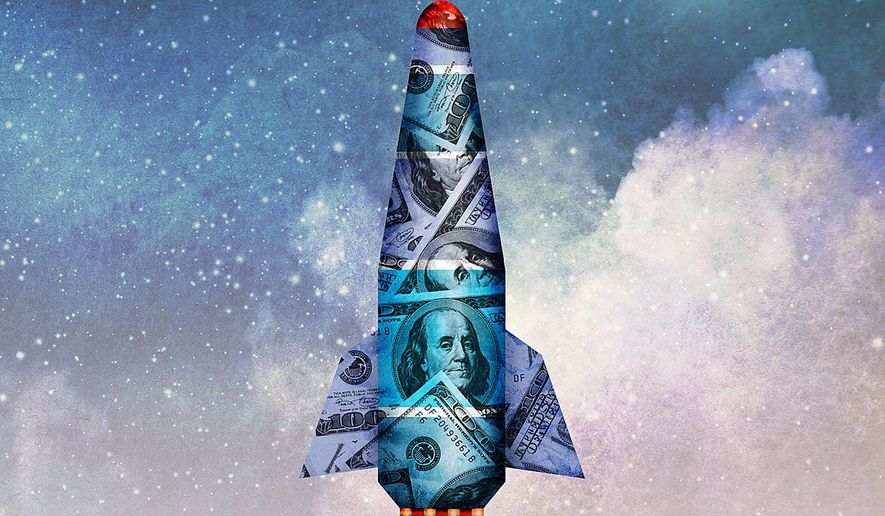OPINION:
No one likes hidden fees. From unauthorized phone charges to home closing costs and prepaid card levies, they take a toll on low and middle-income Americans. To mitigate consumer outrage, members of Congress often demagogue unknown expenditures like ATM and airline baggage fees in committee hearings; costs which usually do not amount to more than a few dollars.
While some of these nominal fees are distasteful, at least consumers ultimately come to terms with them. Unfortunately, this is not always the case when dealing with the federal government, especially on high-ticket items. In fact, last week, one aerospace manufacturer may have incurred unanticipated costs to the tune of tens of millions or even billions on our bills, and yet the government is refusing to even disclose if there are any. Most members of Congress have yet to say a word.
SpaceX recently conducted Project Zuma, a secret mission involving a secret payload for a secret government agency. Some believe that costly problems occurred with the flight, although no one is certain on this point either because the outcome is apparently a secret, too.
Given that this mission involves taxpayer dollars, reporters and activists have been demanding answers. In the middle of last week, a reporter for Bloomberg pressed the Pentagon, asking: “This is a billion-dollar satellite. It’s been four days. Was it a success or a failure? And what’s the fate of the satellite?” Declining to answer, they advised him to refer all questions to SpaceX.
This suggestion was not taken very seriously. Asking a launch provider if it failed is the equivalent of querying a politician on potential wrong-doings. Instincts naturally tell both to deny everything.
This is the taxpayers’ money we’re talking about. Doesn’t the government owe them the truth?
After all, Washington didn’t exactly decide on the most reliable business available for this secret yet ostensibly important mission; it picked one deserving of quite a few poor Yelp reviews. In 2015, SpaceX’s Falcon 9 exploded while operating on a $110 million government contract. In 2016, it blew up while on a $62 million government contract, destroying a $205 million Facebook satellite in the process. To say the least, it wouldn’t be very shocking if the Falcon 9 failed to operate as intended again in 2018.
Meanwhile, just days after this SpaceX launch, the United Launch Alliance (ULA) completed its 124th-consecutive successful mission for the National Reconnaissance Office (NRO) — a substantial comparative difference. Is it time to cut off funding or put SpaceX on the back-burner until it matures into a more reliable contractor? At a minimum, the government should aggressively pursue answers as to why SpaceX seems to have so many more costly explosions and mission failures than its competitors.
Taxpayers are tired of getting ripped off. Perhaps SpaceX does indeed have some value on the marketplace — it does often offer cheaper rockets — but it’s hard to gauge its worth when the government seems to always shield the company’s problems from the public’s view.
Some argue that this favoritism has existed for years, not weeks. For example, NASA has still not released a detailed, public report of SpaceX’s 2015 explosion even though it released one of the company’s competitor, Orbital ATK. Rep. Lamar Smith was right on target when he said this “raises questions about not only the equity and fairness of NASA’s process for initiating independent accident investigations, but also the fidelity of the investigations themselves.”
There are definite potential motives for these suspected hide-and-seek games. Since the Tea Party Massacre, Americans have always been the de facto market regulators; the “invisible hands” working behind the scenes to ensure quality control. When the mobs decry a dishonest politician, he or she is voted out of office. When enough speak out against a practice in Washington, things change. But none of this can occur without public knowledge, something that SpaceX-favoring bureaucrats likely know all too well.
If the government wants to continue using providers that may be providing sub-par performance, that’s its prerogative. At the very least, though, it owes the masses truth and transparency.
Without it, America is no longer operating as a democratic republic. No information means no public voice, while the megaphones of politicians and bureaucrats continue to expand.
There is nothing less American than this, and it should change right now — this week — with an explanation of what happened with the Zuma mission. The American people deserve to know. After all, it’s their money that’s on the line, and their national security that’s at risk.
• Peter Weyrich has worked for free market advocacy organizations, including the Free Congress Foundation and Coalitions for America.




Please read our comment policy before commenting.